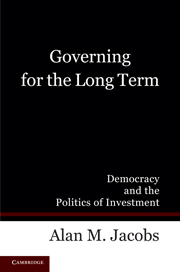Book contents
- Frontmatter
- Contents
- List of Figures and Tables
- Acknowledgments
- PART I PROBLEM AND THEORY
- PART II PROGRAMMATIC ORIGINS: INTERTEMPORAL CHOICE IN PENSION DESIGN
- PART III PROGRAMMATIC CHANGE: INTERTEMPORAL CHOICE IN PENSION REFORM
- Introduction
- 7 Investment as Last Resort
- 8 Shifting the Long-Run Burden
- 9 Committing to Investment
- 10 Constrained by Uncertainty
- PART IV CONCLUSION
- Bibliography
- Index
10 - Constrained by Uncertainty
Reforming German Pensions, 1989 and 2001
Published online by Cambridge University Press: 05 June 2012
- Frontmatter
- Contents
- List of Figures and Tables
- Acknowledgments
- PART I PROBLEM AND THEORY
- PART II PROGRAMMATIC ORIGINS: INTERTEMPORAL CHOICE IN PENSION DESIGN
- PART III PROGRAMMATIC CHANGE: INTERTEMPORAL CHOICE IN PENSION REFORM
- Introduction
- 7 Investment as Last Resort
- 8 Shifting the Long-Run Burden
- 9 Committing to Investment
- 10 Constrained by Uncertainty
- PART IV CONCLUSION
- Bibliography
- Index
Summary
In few countries have the objective pressures for pension reform been as strong as in Germany. On one level, demographic change is expected to hit Germany earlier and harder than most other industrialized countries. At the same time, the 1990s brought unusually high and sustained levels of unemployment, especially in the former East, combined with high rates of early retirement. Together, demographic and economic forces have pushed total social-insurance tax rates – contributions for pensions as well as health care and unemployment insurance – to unprecedented levels: by the end of the 20th century, they would add 40 percent to employers' total wage bill. Moreover, with the pension program financed partly out of general revenues, the scheme's financial difficulties began to place mounting demands on the federal budget just as Economic and Monetary Union was placing tight limits on European Union member states' deficit levels. As Germany's economic woes deepened, the country's ideological climate also began to shift, with the postwar social-market consensus giving way to conflict over the fundaments of social policy. With increasing persistence and persuasive effect, German business organizations, economic institutes, and reformist politicians insisted that the country could no longer compete on world markets or generate jobs unless it scaled back its generous, status-preserving welfare state.
As a result of these combined strains, the domestic policy agenda in West and unified Germany has, since the mid-1980s, been increasingly dominated by efforts to reform the welfare state.
Information
- Type
- Chapter
- Information
- Governing for the Long TermDemocracy and the Politics of Investment, pp. 215 - 238Publisher: Cambridge University PressPrint publication year: 2011
